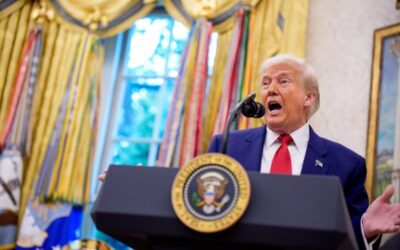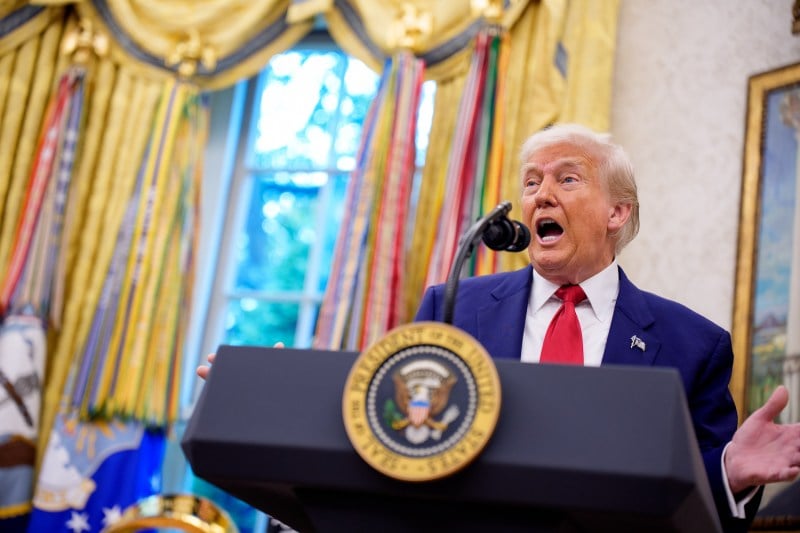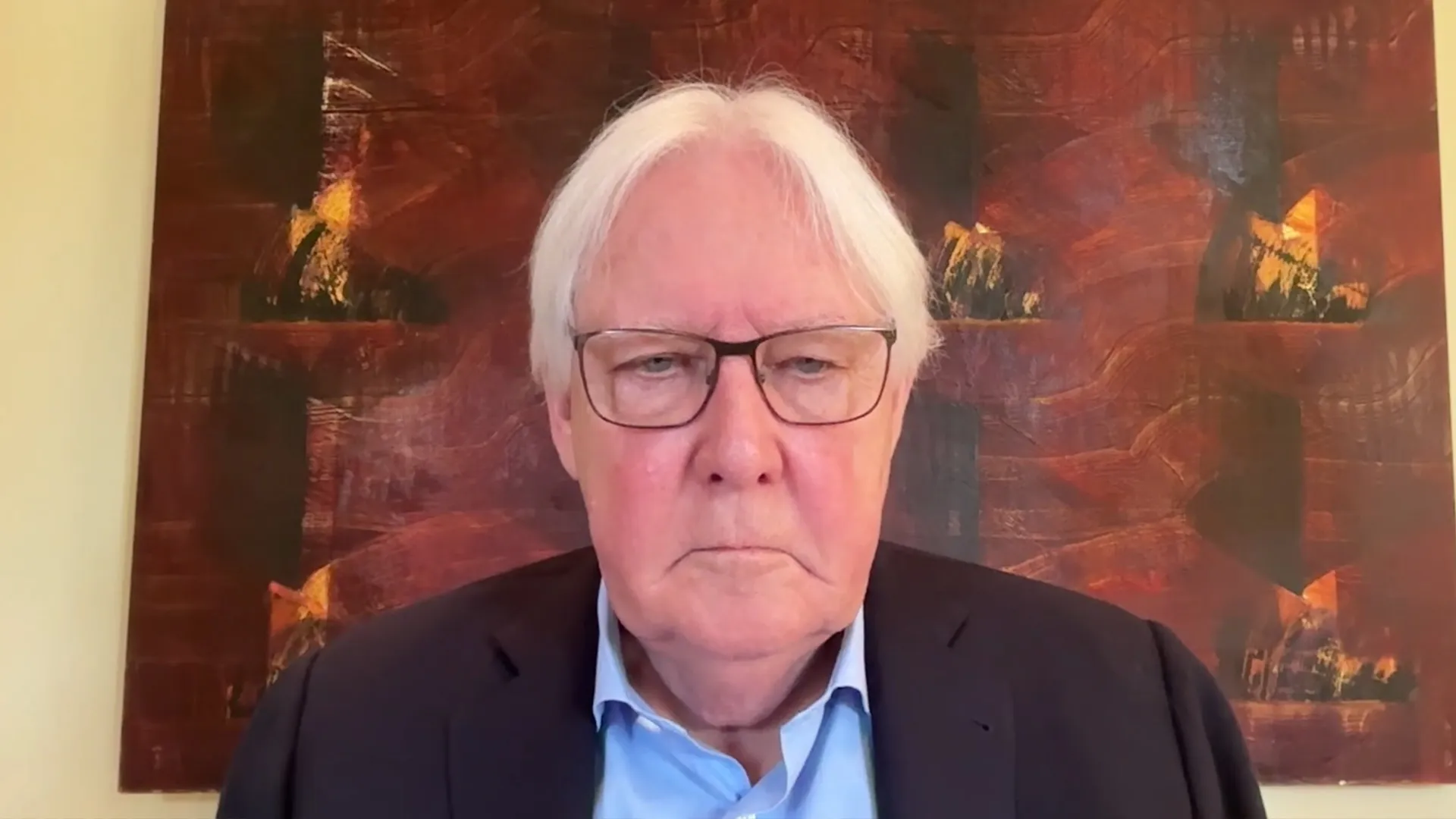Trump’s Attacks on Harvard Cause Alarm in China

Trump’s Attacks on Harvard Cause Alarm in China
Ongoing fears of student espionage are largely unfounded.
A student walks past a building on the Harvard University campus in Cambridge, Massachusetts, on May 24. Zhu Ziyu/VCG via Reuters
Welcome to Foreign Policy’s China Brief.
The highlights this week: Chinese students are caught up in Harvard University’s tussle with the Trump administration, China’s defense minister is skipping the premier Asian security forum, and Beijing continues its domestic manufacturing push.
Welcome to Foreign Policy’s China Brief.
The highlights this week: Chinese students are caught up in Harvard University’s tussle with the Trump administration, China’s defense minister is skipping the premier Asian security forum, and Beijing continues its domestic manufacturing push.
Trump Targets International Students
The Trump administration’s decision last week to block Harvard University from accepting international students has caused consternation in China, where the university has long enjoyed near-mythical status among ambitious students and their parents. There are currently 1,282 Chinese students at Harvard—around 12.6 percent of its total international student population. Under the new rules, which are currently on hold by judicial order, these students would be forced to transfer elsewhere.
China sends more students to the United States than any other country. The 2023-2024 academic year was the exception, with India taking the top spot. That year, there were 277,398 Chinese students enrolled in U.S. universities—down considerably from the 2019-2020 academic year, before the COVID-19 pandemic effectively cut off new international students.
During U.S. President Donald Trump’s first term, senior advisor Stephen Miller attempted to persuade Trump to eliminate Chinese student visas entirely, citing espionage concerns. But the president was convinced otherwise by then-U.S. ambassador to China Terry Branstad, who argued that losing Chinese students would be a painful financial blow for small colleges, including those in his home state of Iowa.
Branstad’s argument proved correct: The post-pandemic drop in international students cost U.S. universities approximately $10 billion, according to early estimates. Most of those students, especially Chinese ones, still studied abroad but chose to do so in other countries.
However, the second Trump administration, which has intensified its assaults on migration and higher education, may see hits to universities as a win for its agenda this time around. The White House is now broadening its attack on students even further: On May 27, Secretary of State Marco Rubio ordered U.S. embassies worldwide to temporarily halt all student visa interviews.
While the administration seems primarily motivated by a wider animus against higher education and migration, there have also been specific fears of espionage by Chinese students. Some of the more extreme hawks have portrayed Chinese students as a fifth column or a Trojan horse within the United States. Broader conspiracy theories about supposed Chinese infiltration are common on the right; Trump himself has promoted some and has reportedly accused “almost every” Chinese student of being a spy.
To be fair, worries about Chinese espionage through students is not new or exclusive to one party. There have already been probes into several colleges, and some Chinese graduate students in STEM fields have been targeted for deportation. Even former President Joe Biden maintained Trump’s ban on graduate students from schools connected to the Chinese military.
It’s true that a small number of Chinese students have been charged with espionage, in cases ranging from firm to shaky. But the total number of instances is a trickle compared to the flood of Chinese students. Plus, the last U.S. attempt to target academic involvement with China—the first Trump administration’s China Initiative—was a disaster that resulted in numerous failed court cases and accusations of racism.
But despite Washington’s fixation on espionage, Beijing’s chief concern isn’t spycraft as much as making sure students stay ideologically loyal and monitoring them for dissent while they study abroad. As reporter Bethany Allen has documented, Beijing spends considerable resources attempting to control the Chinese Students and Scholars Associations on foreign campuses due to long-standing fears that time abroad is a breeding ground for rebellion.
Even if the Trump administration walks back its campaign against international students, a lot of damage has already been done. Sending their child abroad remains a very expensive proposition for Chinese families—and not one they’re willing to accept a lot of risk on.
What We’re Following
Shangri-La Dialogue. Asia’s premier security forum begins later this week in Singapore, and it’s already intersecting with Chinese domestic politics. Last year, Chinese Defense Minister Dong Jun delivered a trenchant speech targeting the United States; this year, he’s reportedly skipping the dialogue altogether.
The ongoing purge of the Chinese military, linked to genuine corruption, especially around the People’s Liberation Army Rocket Force (PLARF), resulted in the removal of both of Dong’s predecessors. Dong was reported to be a target last December after briefly disappearing from the public eye, but he reappeared not long after.
Dong has no known ties to the PLARF, so it’s possible that he was absent from public view for other reasons, such as health concerns. The Chinese Communist Party does not give out information about its leaders’ health. This can spark wild rumors, just like what happened when Chinese President Xi Jinping was sick on a 2023 trip to South Africa.
COVID-19 concerns. The new COVID-19 variant that has caused a surge of cases in China is now reaching the United States. Several cases have been detected in international travelers arriving at major U.S. airports.
As noted last week, this variant seems to hit children unusually hard, but otherwise remains, like other omicron variants, largely mild—similar to the flu but with a painful sore throat. Prominent Chinese doctor Zhong Nanshan has said that the latest wave of infections has already peaked in China, but the country’s COVID statistics remain highly unreliable.
FP’s Most Read This Week
- A Russia-NATO War Would Look Nothing Like Ukraine by Fabian Hoffmann
- Russia Has Started Losing the War in Ukraine by Michael Kimmage
- Trump Gets the Middle East Right by Steven A. Cook
Tech and Business
Made in China. Bloomberg reported on May 26 that Beijing is planning to continue its push for high-quality domestic manufacturing, despite pressure from the rest of the world to ease off its manufacturing drive, which has produced overcapacity in many sectors. Xi’s signature Made in China 2025 program, which combined ambitions for technological advancement and domestic manufacturing, had a mixed success record. China remains highly dependent on imports in many key sectors, but its considerable technological advances in certain fields, including drones and solar power, have alarmed U.S. policymakers.
China has a mixed economy, where state planning and five-year plans factor significantly. There’s a big gulf between announcements and practice, and the plans’ execution shifts considerably over time. But it’s also perfectly understandable that China has no intention of quitting its climb up the manufacturing value chain.
Anti-espionage campaign. While Americans fret about Chinese students, China’s Ministry of State Security continues to be dominated by anti-foreign paranoia. Its latest broadside, published on social media platform Weixin, warns of “businessmen who do no business” and “the lover who has no real feelings” as signs of potential foreign agents. (As usual, no specific country is named as a threat.)
China’s broad criminalization of information-gathering attempts has previously led to it targeting everyone from due diligence firms to nongovernmental organization workers, creating an atmosphere of fear in which any contact with foreigners can be deemed suspicious.
James Palmer is a deputy editor at Foreign Policy. Bluesky: @beijingpalmer.bsky.social
Stories Readers Liked
In Case You Missed It
A selection of paywall-free articles

Four Explanatory Models for Trump’s Chaos
It’s clear that the second Trump administration is aiming for change—not inertia—in U.S. foreign policy.




















Join the Conversation
Commenting is a benefit of a Foreign Policy subscription.
Subscribe
Subscribe
Already a subscriber?
.
View Comments
Join the Conversation
Join the conversation on this and other recent Foreign Policy articles when you subscribe now.
Subscribe
Subscribe
Not your account?
View Comments
Join the Conversation
Please follow our comment guidelines, stay on topic, and be civil, courteous, and respectful of others’ beliefs.
View Comments
Change your username |
Log out
Change your username:
CANCEL
Confirm your username to get started.
The default username below has been generated using the first name and last initial on your FP subscriber account. Usernames may be updated at any time and must not contain inappropriate or offensive language.